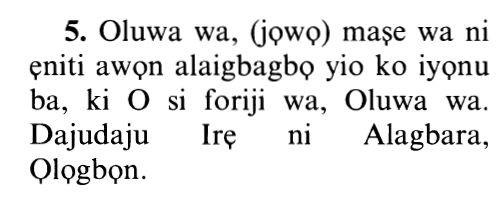60vs5
Select any filter and click on Go! to see results
رَبَّنَا لَا تَجْعَلْنَا فِتْنَةً لِّلَّذِينَ كَفَرُوا وَاغْفِرْ لَنَا رَبَّنَا إِنَّكَ أَنتَ الْعَزِيزُ الْحَكِيمُ
Rabbana la tajAAalna fitnatan lillatheena kafaroo waighfir lana rabbana innaka anta alAAazeezu alhakeemu
Index Terms
Click to play
Yoruba Translation

Hausa Translation
"Yã Ubangijinmu! Kada Ka sanya mu fitina ga waɗanda suka kãfirta, kuma Ka yi gãfara gare Mu. Ya Ubangijinmu! Kai ne Mabuwãyi, Mai hikima!
Asbabu n-Nuzuul (Occasions of Revelation)
رَبَّنَا لَا تَجْعَلْنَا فِتْنَةً لِّلَّذِينَ كَفَرُوا ...
Our Lord! Make us not a trial for the disbelievers,
Mujahid said,
"It means, `Do not punish us by their hands, nor with a punishment from You.' Or they will say, `Had these people been following the truth, the torment would not have struck them'.''
Ad-Dahhak said something similar.
Qatadah said,
"Do not give the disbelievers victory over us, thus subjecting us to trials by their hands. Surely, if You do so, they would then think that they were given victory over us because they are on the truth.''
This is the meaning that Ibn Jarir preferred.
Ali bin Abi Talhah reported from Ibn `Abbas:
"Do not give them dominance over us, lest we suffer trials by their hands.''
Allah's statement,
... وَاغْفِرْ لَنَا رَبَّنَا إِنَّكَ أَنتَ الْعَزِيزُ الْحَكِيمُ ﴿٥﴾
and forgive us, Our Lord! Verily, You, only You, are the Almighty, the All-Wise.
means, `cover our mistakes from being exposed to other than You, and forgive us for what (sin) is between us and You.'
أَنتَ الْعَزِيزُ (Verily, You, only You, are the Almighty), `and those who seek refuge in Your majesty are never dealt with unjustly,' الْحَكِيمُ (the All-Wise), `in Your statements, actions, legislation and decrees.'
" ربنا لا تجعلنا فتنة للذين كفروا " قال مجاهد : معناه لا تعذبنا بأيديهم ولا بعذاب من عندك فيقولوا لو كان هؤلاء على حق ما أصابهم هذا وكذا قال الضحاك وقال قتادة لا تظهرهم علينا فيفتنونا بذلك يرون أنهم إنما ظهروا علينا لحق هم عليه واختاره ابن جرير وقال علي بن أبي طلحة عن ابن عباس لا تسلطهم علينا فيفتنونا وقوله تعالى " واغفر لنا ربنا إنك أنت العزيز الحكيم " أي واستر ذنوبنا عن غيرك واعف عنها فيما بيننا وبينك " إنك أنت العزيز " أي الذي لا يضام من لاذ بجنابك " الحكيم" في أقوالك وأفعالك وشرعك وقدرك .
"ربنا لا تجعلنا فتنة للذين كفروا" أي لا تظهرهم علينا فيظنوا أنهم على الحق فيفتنوا أي تذهب عقولهم بنا "واغفر لنا ربنا إنك أنت العزيز الحكيم" في ملكك وصنعك
أي لا تظهر عدونا علينا فيظنوا أنهم على حق فيفتتنوا بذلك . وقيل : لا تسلطهم علينا فيفتنونا ويعذبونا .
I'raab - grammatical analysis of the Qur'an
«رَبَّنا» منادى مضاف «لا تَجْعَلْنا» مضارع مجزوم بلا و«نا» مفعول به أول «فِتْنَةً» مفعول به ثان «لِلَّذِينَ» متعلقان بفتنة والجملتان الندائية والفعلية استئنافيتان لا محل لهما ، «كَفَرُوا» ماض وفاعله والجملة صلة ، «وَاغْفِرْ» فعل دعاء فاعله مستتر و«لَنا» متعلقان بالفعل «رَبَّنا» توكيد لفظي لما قبله ، «إِنَّكَ» إن واسمها «أَنْتَ» ضمير فصل «الْعَزِيزُ الْحَكِيمُ» خبران والجملة الاسمية تعليل والجملة الفعلية معطوفة على ما قبلها
